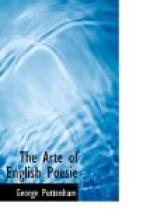to giue vunto three different sounds three seuerall
names: to that which was highest lift vp and
most eleuate or shrillest in the eare, they gaue the
name of the sharpe accent, to the lowest and most base
because it seemed to fall downe rather then to rise
vp, they gaue the name of the heauy accent, and that
other which seemed in part to lift vp and in part to
fall downe, they called the circumflex, or compast
accent: and if new termes were not odious, we
might very properly call him the (windabout) for so
is the Greek word. Then bycause euery thing that
by nature fals down is said heauy, & whatsoever naturally
mounts upward is said light, it gaue occasion to say
that there were diuersities in the motion of the voice,
as swift & slow, which motion also presupposes time,
by cause time is
mensura motus, by the Philosopher:
so haue you the causes of their primitiue inuention
and vse in our arte of Poesie, all this by good obseruation
we may perceiue in our vulgar wordes if they be of
mo sillables then one, but specially if they be
trissillables,
as for example in these wordes [
altitude] and
[
heauinesse] the sharpe accent falles vpon
[
al] & [
he] which be the
antepenultimaes:
the other two fall away speedily as if they were scarse
founded in this
trissilable [forsaken] the
sharp accent fals vpon [
sa] which is the
penultima,
and in the other two is heauie and obscure. Againe
in these
bisillables, endure, unsure, demure, aspire,
desire, retire, your sharpe accent falles vpon
the last sillable: but in words
monosillable
which be for the more part our naturall Saxon English,
the accent is indifferent, and may be vsed for sharp
or flat and heauy at our pleasure. I say Saxon
English, for our Normane English alloweth vs very
many
bissillables, and also
triffilables
as,
reuerence, diligence, amorous, desirous,
and such like.
CHAP. VII.
Of your Cadences by which your meeter is made Symphonicall
when they be sweetest and most solemne in a verse.
As the smoothenesse of your words and sillables running
vpon feete of sundrie qualities, make with the Greekes
and Latines the body of their verses numerous or Rithmicall,
so in our vulgar Poesie, and of all other nations
at this day, your verses answering eche other by couples,
or at larger distances in good [cadence] is
it that maketh your meeter symphonicall. This
cadence is the fal of a verse in euery last word with
a certaine tunable sound which being matched with
another of like sound, do make a [concord.]
And the whole cadence is contained sometime in one
sillable, sometime in two, or in three at the most:
for aboue the antepenultima there reacheth
no accent (which is chiefe cause of the cadence) vnlesse
it be vsurpation in some English words, to which we
giue a sharpe accent vpon the fourth as, Honorable,
matrimonie, patrimonie, miserable, and such other




